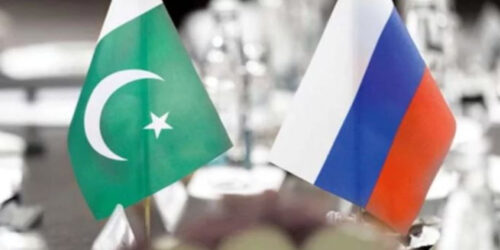The country’s flagship project, Pakistan Stream Gas Pipeline (PSGP), will be financed through the Gas Infrastructure Development Cess (GIDC), an official said on Monday.
During a meeting of the Senate Standing Committee on Petroleum, held under the chairmanship of Senator Muhammad Abdul Qadir, Petroleum Division secretary Dr Arshad Mahmood said that this joint venture between Russia and Pakistan is the country’s most strategic project.
The Ministry of Finance had already collected Rs321 billion under the head of the Gas Infrastructure Development Cess Act. The senior officials had already assured them that they will provide the funding for this project as per the requirement, he added.
Dr Mahmood said that the total amount of GIDC imposed on industry is Rs790 billion, of which the government had collected Rs337 billion, whereas, Rs356 billion is stuck in litigation because different industries took stay order from the court, despite the fact that they had already charged GIDC from the consumers.
The project’s cost has been estimated at $2.5 billion, he said, adding that the pipeline will be laid from Karachi to Kasur on an 1,100km area.
The completion of the Pakistan Stream Gas Pipeline will enable the country to import and transport over an additional 1.5-2.5 billion cubic feet of gas per day from Karachi to Kasur.
Currently, Pakistan has the capacity to import 1.2bcfd, which can go up to 1.5bcfd if the additional capacity of both FSRUs at PGPL and Engro terminals is used.
However, after completion of the pipeline project, the two new terminals, one by Energas of the Lucky Group and the other one by Tabeer, a subsidiary of major global firms led by Mitsubishi of Japan, would also come on stream.
The diameter of the pipeline will be 56-inches. Russia has matchless expertise in laying down the 56-inches diameter pipeline, and its experts will also train the technical human resources of local gas companies, Sui Southern Gas Company (SSGC) and the Sui Northern Gas Pipelines Limited (SNGPL) on how to lay down the 56 diameter pipeline, he added.
Dr Mahmood said that Russia will have 26 per cent share in the project but will have no sovereign guarantee from Pakistan on the rate of return.
The project will be completed in two-and-a-half years to three years’ time, he added.
The Senate committee chairman said the ministry has been working on this project since 2018. “Your ministry took four years for paperwork and now if you complete this project in three years’ time, I will be surprised,” he said.
Regarding the embezzlement in Hascol, the petroleum secretary said the ministry is closely monitoring the situation, adding that it’s the responsibility of the Securities and Exchange Commission of Pakistan (SECP), State Bank of Pakistan (SBP) and the Federal Investigation Agency (FIA) to find out the reasons behind the nose-dived share price of Hascol from Rs370 to Rs8 in three years.
Oil and Gas Regulatory Authority (Ogra) chairman Masroor Khan said that of the total oil storage capacity, the share of Hascol is 15 per cent, which is 80,000 tonnes.
Hascol is also operating 611 petrol pumps and on the motorway it owned all the petrol pumps, he said, adding: “We’re making sure that Hascol [is] maintaining required stocks but, at the same time, we’re cautious that any harsh action against the company can create a shortage of petroleum products.”
Senator Mohsin Aziz said that the oil marketing companies fall under the ambit of the Ministry of Petroleum and Ogra and; therefore it is the responsibility of the two organisations to look into the Hascol issue.
“In an OMC these kinds of losses are not possible, there must be [a] high-level of corruption and embezzlement in the company, which is very alarming,” he said.
Dr Mahmood said that it is the corruption case of Rs74 billion.
“[The] State Bank and SECP should be in a better position to brief the committee as to how $40 million slipped away from the company’s account,” he said.
The committee decided to summon the officials of SECP, SBP and FIA on the issue in the next meeting.
During the meeting, the petroleum secretary said 60 per cent of the liquefied petroleum gas (LPG) has been met through imports, adding that since it is a poor man’s fuel, the ministry seeks reduction in the import duties.
However an official of the Pakistan Petroleum Limited opposed the idea and said that if the taxes will be reduced then it will not be economically viable for them to produce LPG.





